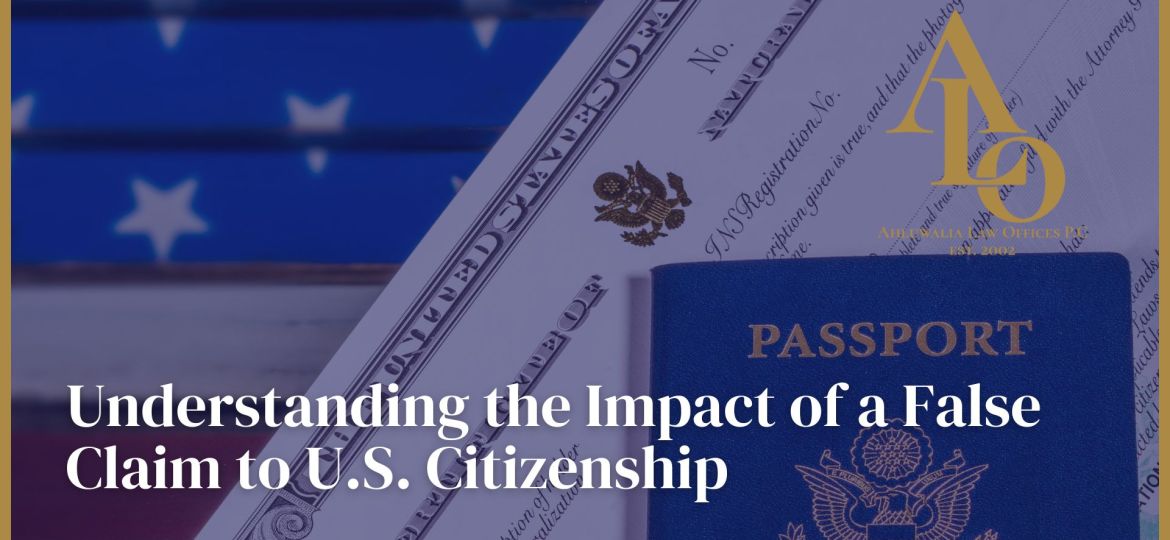
For foreign nationals navigating the U.S. immigration system, making a false claim to U.S. citizenship—intentionally or not—can result in permanent and irrevocable consequences. Recent updates to the USCIS Policy Manual, following the Matter of Zhang decision by the Board of Immigration Appeals (BIA), have clarified how these claims are evaluated—and the threshold is lower than many might assume.
So what exactly qualifies as a false claim? And what does it mean for your visa, green card, or future adjustment of status?
Let’s break it down.
What Is Considered a False Claim?
According to Section 212(a)(6)(C)(ii) of the Immigration and Nationality Act (INA), any noncitizen who falsely claims U.S. citizenship “for any purpose or benefit” under federal or state law is inadmissible.
And it doesn’t stop there. Under current policy:
- Intent is no longer required.
Thanks to the precedent set in Matter of Zhang (27 I&N Dec. 569, BIA 2019), even unintentional false claims can trigger inadmissibility. - The claim must have been made on or after September 30, 1996, the effective date of the Illegal Immigration Reform and Immigrant Responsibility Act (IIRIRA).
- There is generally no waiver available.
Unlike many other grounds of inadmissibility, there is no standard immigrant waiver for a false citizenship claim.
In simpler terms: Claiming to be a U.S. citizen—even by accident—can permanently bar you from lawful status in the U.S.
Real-World Examples That Can Trigger This Ground
You might think a false claim only applies if someone lies under oath. But the reality is broader:
- Checking the “U.S. Citizen” box on a job application (especially one tied to E-Verify)
- Marking “citizen” on a voter registration form
- Using a U.S. passport or someone else’s documentation
- Misrepresenting citizenship on college financial aid forms or benefits applications
Any of these, if done on or after September 30, 1996, can be treated as a false claim with no forgiveness under the law.
Are There Any Exceptions?
Yes—but they are extremely narrow.
An individual may not be found inadmissible if all three of the following apply:
- They permanently resided in the U.S. before the age of 16;
- Both parents (or the legal custodial parent) were U.S. citizens;
- The individual reasonably believed they were a U.S. citizen at the time of the claim.
Unless you meet this strict exemption, the law offers no second chances. This is one of the most severe penalties under immigration law.
What USCIS Officers Now Look For
The revised guidance in the USCIS Policy Manual (Volume 8, Part K) outlines the evaluation process. Officers are instructed to assess:
- Whether the false claim was made in connection with a benefit or legal purpose (e.g., employment, public benefits, education)
- The subjective intent of the applicant, even though intent is no longer required to find inadmissibility
- Whether any documentary evidence (e.g., forms, statements, applications) supports the allegation
This standard gives USCIS broad discretion and makes legal counsel essential when facing such allegations.
What Should You Do If You’ve Made a False Claim?
If you suspect that you may have inadvertently claimed U.S. citizenship, consult a qualified immigration attorney before taking any action—especially before filing for adjustment of status, naturalization, or returning from travel abroad.
Do not assume the issue will go unnoticed.
At Ahluwalia Law Offices, we counsel clients on the nuanced defenses and strategic considerations around false claim allegations. Even if you’re unsure, getting advice now could protect your future in the U.S.
Final Thought: Prevention is the Best Protection
In today’s immigration environment, every checkbox matters. A single misstatement, even made without intent, can have life-altering consequences. Foreign nationals, visa holders, and investors must be extremely cautious when filling out any official documentation that references citizenship status.
If you’re unsure how your past answers might be interpreted under this rule, it’s time to get clarity—before USCIS does.
Our team at Ahluwalia Law Offices helps immigrants and investors make informed, safe choices. Schedule a consultation to review your situation and avoid irreversible missteps.

